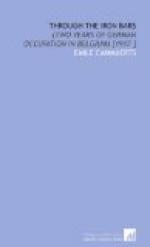Let us look now at the next phase. As soon as the Belgian army has achieved its junction with the Allies on the Yser and all communications are cut between the Government and the people, the Germans cease to consider Belgium as an occupied territory, and seize upon every pretext to treat her as a conquered country, which will, sooner or later, become part of the Empire. They no longer take the trouble to explain or justify their oppressive measures, or to reconcile them with their former promises. They simply ignore them. First in Namur (November the 15th, 1914), then in Brussels (June the 30th, 1915), it becomes a crime to wear the tricolour cockade. The Te Deum, which is celebrated every year, on November 15th, in honour of King Albert’s Saint’s day, is forbidden. From the month of March, 1915, it is practically a forbidden thing to sing the Brabanconne, even in the schools. All patriotic manifestations, on the occasion of the King’s Birthday (April 8th) and of the anniversary of Belgian Independence day (July 21st) are severely prosecuted.
In some of the orders issued there is still a weak attempt at “respecting,” in a German way, “the people’s patriotic feelings.” The Governor of Namur, for instance, discriminates with the acutest subtlety between wearing the national colours in private and in public, and the Brabanconne can for a time be sung, so long as it is not rendered “in a provoking manner.” In fact, the Belgians are free to manifest their patriotism so long as they are neither seen nor heard. They are generously allowed to line their cupboards with tricolour paper and to hum their national tunes in the depth of their cellars. But, in most of the orders made under Governor von Bissing’s rule (his reign began on December 3rd, 1914), this last pretence of consideration and respect disappears entirely. “I warn the public,” declares the Governor of Brussels on July the 18th, 1914, “that any demonstration whatsoever is forbidden on July 21st next.”
More than that, the German Administration frequently goes out of its way to hurt the people’s feelings. The fact of helping a patriot to join the Army is not merely punished as a crime against the Germans, it is delicately called “a crime of treason,” and when people are condemned because they are suspected of belonging to the Belgian intelligence service, the public posters announcing their condemnation speak of them as supplying information “to the enemy.”
The sham tolerance of the first days has given way to a restless repression, and even, during the last year, to deliberate persecution. Schools may be inspected at any time by the authorities and every “anti-German manifestation” (that is to say, any pro-Belgian teaching) is severely punished. Shops are raided so that every patriotic picture post-card (especially the portraits of the Royal Family) may be seized, and even the intimacy of the private home is not respected. To begin with, the Belgians have been allowed to show their loyalty—with discretion; next, every patriotic manifestation is excluded from public life; and last, the Germans, through their spies, penetrate the homes of every citizen, and endeavour to extirpate by a reign of terror these same feelings which they so emphatically promised to respect.




